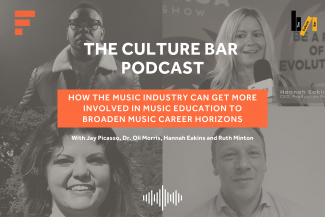In this Culture Bar Podcast, we focus on collaborations between Higher Education and the Music Industry, the breadth and diversity of Career Pathways, and what could be improved to ensure that inclusive access to the music industry continues to be a priority for all involved.
Hosted by HP Foundation’s Manager, Lissy Kelleher-Clarke, the panel includes Jay Picasso (Artist Relationship Manager at Abbey Road), Dr. Oli Morris (Director of Education & Skills of UK Music), Hannah Eakins (CEO of Production Futures) and Ruth Minton (Lecturer at University of Liverpool & HP Foundation Trustee).
This podcast is part of the HarrisonParrott Foundation’s Music Access Awareness Week.
